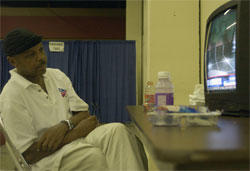The Will Rogers Coliseum, which has been turned into a shelter for those displaced by Hurricane Katrina, is now home to more than 375 evacuees from New Orleans. Most of the shelter’s residents arrived Saturday, and an additional 20 buses are scheduled to arrive in the Dallas/Fort Worth area soon, said Human Services Manager Sofia Singleton.
The shelter is prepared to house evacuees long-term, Singleton said. Medical care, counseling, phone services, clothing and other necessities are available on site to residents, she said.
“Here in Fort Worth I think we are doing a very good job of trying to coordinate care and connect people to all the different resources that we believe will be necessary,” Singleton said.
About 50 children have recently started at local schools, said American Red Cross volunteer Paula Denton, who has been working with the children at the shelter.
“The school bus came and picked them up,” Denton said.
Dr. Bruce Dubin said there are doctors are on hand giving people checkups, prescriptions and any necessary medical care. Several people have already been taken to the hospital and many are suffering from complications of the tragedy, he said.
There were several people with foot problems because many had their feet in the water for days, Dubin said.
“There were a lot of open cuts and wounds with infections,” he said. “A lot of pneumonia and asthma as well.”
Singleton said the shelter is staffed mainly by Red Cross volunteers, but more are always welcome.
“We have folks showing up saying, ‘What can I do,'” Singleton said. “The human heart is incredible.”
TCU football players Andrew Ward and Justin Ellis along with Director of Football Operations Mike Sinquefield, Assistant Director of Football Operations Drew Myers and Equipment Room Manager Matt Lewis visited the shelter Monday. They donated items such as large jerseys, shoes and socks.
“We also spent about an hour helping sort through all the donations,” Sinquefield said.
Singleton said she appreciates the support from TCU.
“We would expect nothing less from our neighbor,” Singleton said.

